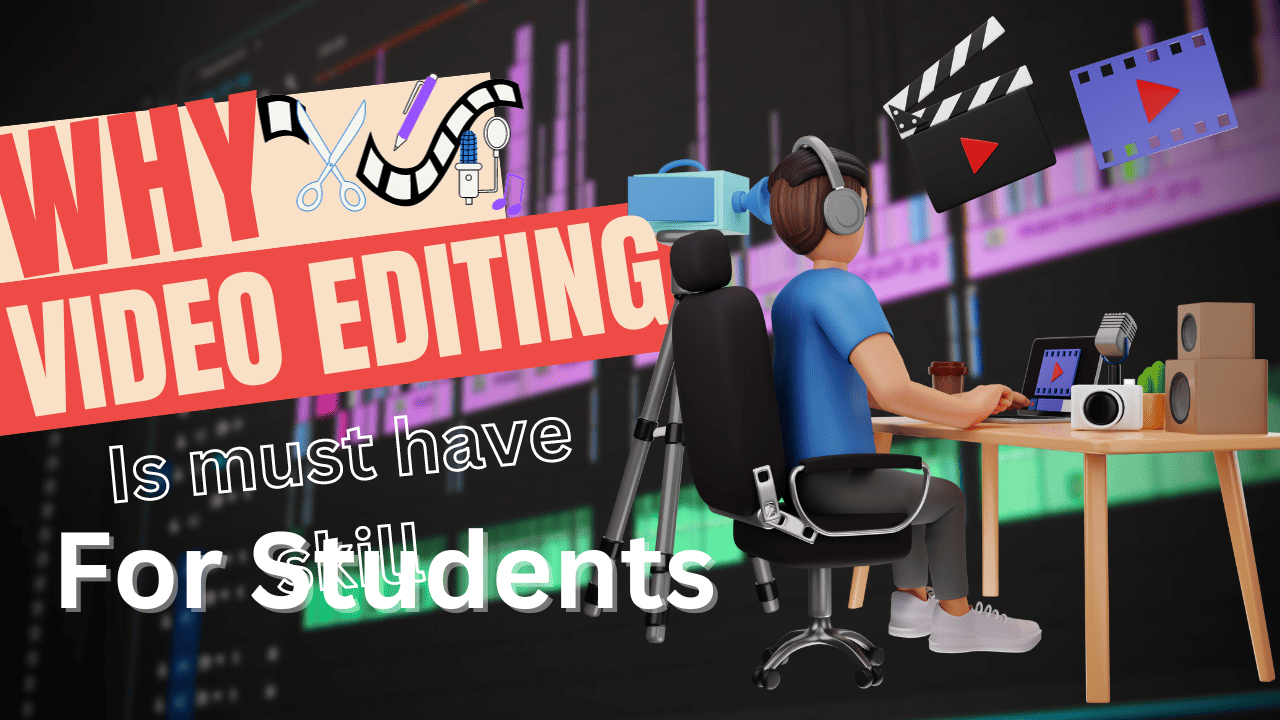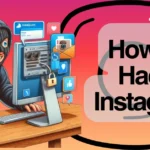Video editing is indeed a valuable skill to have in the digital age. But the question is Why Video Editing is a Must-Have Skill. It allows individuals to create polished and professional-looking videos that can be used for a variety of purposes.
Not only does it let you make cuts, adjust sound, and add effects, but it also enables you to tell a story visually.
Moreover, video editing skills can be beneficial in numerous career paths, such as journalism, marketing, film production, and social media management.
By acquiring video editing knowledge, you can create engaging content that can attract more viewers, increase engagement, and ultimately, help your organization achieve its goals.
In summary, learning video editing is a must-have skill for students and professionals alike in today’s digital landscape.
It opens up a world of possibilities and can help you stand out in a competitive job market. So, let’s go deeper into “Why Video Editing is a Must-Have Skill”.

Table of Contents
Why Video Editing is a Must-Have Skill? What can do?
let me give you an explanation of “Why Video Editing is a Must-Have Skill?” Video editing is a complex art that involves taking multiple film clips and combining them to create a polished final composition. Video editors utilize various techniques such as cutting, trimming, and manipulating sound to create a cohesive and visually appealing video.

The art of video editing draws inspiration from cinematography and photography, and it is an essential component of producing compelling video content.
Video editors utilize software tools such as Adobe Premiere Pro and Final Cut Pro X to blend different video and sound files to create finished video projects.
They are responsible for synchronizing audio and video elements of the film, ensuring continuity between individual frames and scenes, and cleaning up elements of the film to produce a professional-quality video.
Video editors often work closely with directors, cinematographers, and producers to capture the video’s desired pace, movement, and overall feel.
Their work may often go unnoticed, but they represent a crucial part of the video production process. So, mainly this is Why Video Editing is a Must-Have Skill. After we know Why Video Editing is a Must-Have Skill then I want to tell you some Common Professional Uses for Video Editing.
Common Professional Uses for Video Editing
Video editing skills are indeed highly valuable in today’s digital world, and they offer a wide range of career opportunities. You can go on fiverr.com or upwork.com and see the demand for video editors.

From video editors to video managers and motion graphics designers, many roles require video editing knowledge and expertise. These professionals work in a variety of industries, including television and film, internet content creation, advertising agencies, government agencies, and more.
Video editors are tasked with compiling and assembling video content into a finished product. They work closely with other creatives to ensure that the final project is in line with the team’s goals.
In addition to editing skills, video managers need to learn other creative skills such as motion graphics and digital storytelling, as well as soft people skills to ensure that the team works effectively.
Motion graphics designers, on the other hand, build the animated digital assets that video editors insert into video content.
They work with computer-assisted editing tools to create imposing digital images that populate modern entertainment.
Career Opportunities For Video Editors
video editing indeed offers a plethora of career opportunities in today’s digital age. One of the most popular career roles in video editing is freelancing, which provides flexibility in terms of work location and schedule.
Here are some of the most popular career roles that you’ll find in the world of video editing:
- Freelancing video editor – Freelancing video editors have the flexibility to work from anywhere and at any time. They can find jobs on freelancing websites or even in their local environment.
- Film Editor – Film editors work on feature-length productions, ensuring that the film follows the director’s creative vision. Assembles clips in a sequence, cutting together the footage and building the story.
- TV Studio Editor – TV studio editors focus on making things happen in real time, switching between cameras, overlay graphics, and other visuals that help live broadcast audiences experience the show.
- Event Video Editor – Event video editors capture events such as weddings and edit the footage for clients. Many events, particularly weddings, are captured on video for the clients. There’s plenty of this work to go around, and it’s a popular way to get your start in video editing.
- Web Video Editor – Works on short-form videos designed to be published on the web. Web video editors work on short-form videos designed to be published on the web, with a wide variety of clients and subject matters to work with.
- Animator – Creates motion graphics, and puts the finishing touches on productions. In addition to the common video editing platforms, they have skills in effects programs like Adobe After Effects as well.
- Colorist – Colorists perfect color and other visual settings, giving the production a cohesive and polished feel. A special purpose editing role that focuses on perfecting color and other visual settings that give the production a cohesive, polished feel.
How to Start Learning Video Editing
Students who want to learn video editing have several options. Courses are available both in-person and online, and students learning online can enroll in live or asynchronous training sessions.
Students should consider their wants and needs before enrolling in a video editing course and make an informed decision about which course is best for them. The most intensive option available to students is an in-person video editing class.
These courses give students direct access to trained instructors and a group of like-minded students with whom they can network. Because students attend a training facility, they also have access to the service provider’s computer lab.

However, because these courses require you to attend a physical venue for training, some students may have very limited in-person teaching opportunities. Students who cannot attend their preferred in-person training may consider considering live online video editing training instead.
These courses offer many of the benefits of face-to-face courses, especially access to live instructors who can provide feedback and support to students.
Additionally, these courses can be completed at home, giving students more online courses to choose from.
The downside is that students are not provided with the necessary hardware or software, so you need to ensure that they provide their technology.
Some students, especially those with work or family commitments, may want to consider a more flexible on-demand video editing course for their video editing training.
These courses come in different formats and at different costs, giving students more flexibility in learning how to use programs like Premiere Pro and After Effects.
The disadvantage of these courses is that they do not have instructors to help students overcome obstacles that arise.

Finally, students who want to try their hand at video editing but aren’t quite ready to enroll in a professional training course can consider taking advantage of our free tutorials and resources.
Students can also visit the YouTube Learn Video Editing page to view a collection of videos, articles, and other resources to help them learn the basics of video editing.
Top 10 Video Editing Tips for Beginners
I talked about “Why Video Editing is a Must-Have Skill” and How to start video editing”. Now here are some tips for you.
1. Plan your project before you start editing. This will help you stay organized and make the editing process much smoother.
2. Start with the best footage you have. This will save you time and make your project look better.
3. Use a storyboard or shot list to help you plan the sequence of your shots.
4. Keep your edits short and to the point. Long edits can be distracting and boring.
5. Use transitions sparingly. Too many transitions can be jarring and make your project look unprofessional.
6. Use music and sound effects to enhance your project. They can add emotion and depth to your video.
7. Pay attention to the pacing of your video. Keep it moving at a good pace, but don’t rush it.
8. Use color correction and grading to enhance the visual quality of your footage.
9. Use titles and captions to help tell your story. They can add context and information to your video.
10. Don’t be afraid to experiment and try new things. Video editing is a creative process, and sometimes the best ideas come from taking risks.

After knowing “Why Video Editing is a Must-Have Skill”, You can try these tips to start. I hope this article “Why Video Editing is a Must-Have Skill” worked for you.
And if you like video games or want to read about “Why Video Games are Good for Your Brain All this AND more…“- then quickly go there and read this.
OR, If you want to know “Do Laptop Cooling Pads Really Work? Guide To Laptop Cooling Pads.” then go and read this also.
FAQs
What is video editing?
Video editing is the process of manipulating and rearranging video shots to create a new work.
What software is used for video editing?
There are many video editing software available on the market. The most popular ones include Adobe Premiere Pro, Final Cut Pro, iMovie, and DaVinci Resolve.
Can I learn video editing on my own?
Yes, you can learn video editing on your own through online tutorials, books, and courses. However, it may take some time and practice to become proficient in it.
Do I need expensive equipment to learn video editing?
No, you don’t necessarily need expensive equipment to learn video editing. You can start with a basic computer and free or affordable video editing software.
What are some basic video editing techniques?
Some basic video editing techniques include trimming clips, adding transitions, applying color correction, and adding titles and captions.
How can I improve my video editing skills?
You can improve your video editing skills by practicing regularly, experimenting with new techniques, and learning from other editors through online communities and forums.












